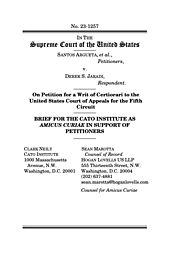Cato’s amicus brief argues that the Fifth Circuit’s ruling offends two fundamental constitutional values: the right to have contested facts in a civil case decided by a jury, and the right to keep and bear arms. As is not unusual, the facts of this case are hotly disputed, and the testimony of police officers differs substantially from that of Argueta’s girlfriend, including as to whether the officers had reasonable suspicion to initiate the stop in the first place and whether Argueta made any “furtive” gestures will fleeing from the police. It is a bedrock principle of American law—and the clear command of the Seventh Amendment—that disputed facts be decided by juries instead of judges. Moreover, the Fourteenth Amendment was passed for the specific purpose of protecting the right of citizens—including particularly non-white citizens like Argueta—to keep and bear arms in self-defense. Allowing police to use lethal force simply because they suspect someone of carrying a gun—even if that person is fleeing from them (which there can be perfectly rational and lawful reasons for doing)—is antithetical to the right of armed self-defense protected by the Second and Fourteenth Amendments. The Supreme Court should take this case and clarify that disputed facts are for juries, not judges, to decide, and that the exercise of one’s right to keep and bear arms does not justify the use of lethal force by police, even when the person exercising that right is fleeing from them.
Argueta v. Jaradi
[D]isputed facts are for juries, not judges, to decide
Learn more about Cato’s Amicus Briefs Program.
In June 2018, Galveston police officers pulled over Luis Argueta and his girlfriend for alleged traffic violations. Argueta exited the car and fled, with one of the officers, Derrick Jaradi, in pursuit. Based on the way he was running, Jaradi suspected, correctly, that Argueta was carrying a gun even though Jaradi did not actually see it. Without warning, Jaradi fired two shots into Argueta’s back, mortally wounding him. Argueta’s family sued Jaradi for wrongful death and excessive force, arguing that it was unlawful for him to use lethal force against a non-threatening, fleeing suspect based on a mere hunch that he might be armed. The district court found that there were contested issues of material fact and refused to grant Jaradi qualified immunity. A divided Fifth Circuit reversed and dismissed the case.

This work is licensed under a Creative Commons Attribution-NonCommercial-ShareAlike 4.0 International License.

